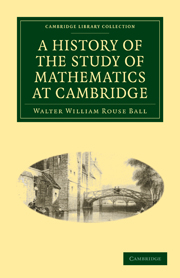Book contents
- Frontmatter
- PREFACE
- Contents
- Chapter I Mediæval mathematics
- Chapter II The mathematics of the renaissance
- Chapter III The commencement of modern mathematics
- Chapter IV The life and works of Newton
- Chapter V The rise of the Newtonian school
- Chapter VI The later Newtonian school
- Chapter VII The analytical school
- Chapter VIII The organization and subjects of education
- Chapter IX The exercises in the schools
- Chapter X The mathematical tripos
- Chapter XI Outlines of the history of the university
- INDEX
Chapter IV - The life and works of Newton
Published online by Cambridge University Press: 07 September 2010
- Frontmatter
- PREFACE
- Contents
- Chapter I Mediæval mathematics
- Chapter II The mathematics of the renaissance
- Chapter III The commencement of modern mathematics
- Chapter IV The life and works of Newton
- Chapter V The rise of the Newtonian school
- Chapter VI The later Newtonian school
- Chapter VII The analytical school
- Chapter VIII The organization and subjects of education
- Chapter IX The exercises in the schools
- Chapter X The mathematical tripos
- Chapter XI Outlines of the history of the university
- INDEX
Summary
The second occupant of the Lucasian chair was Newton. There is hardly a branch of modern mathematics, which cannot be traced back to him, and of which he did not revolutionize the treatment; and in the opinion of the greatest mathematicians of subsequent times—Lagrange, Laplace, and Gauss—his genius stands out without an equal in the whole history of mathematics. It will therefore be readily imagined how powerfully he must have impressed his methods and philosophy on the school which he suddenly raised to be the first in Europe; and the subsequent history of Cambridge (as far as this work is concerned therewith) is mainly that of the Newtonian philosophy.
Isaac Newton was born in Lincolnshire near Grantham on Dec. 25, 1642 (O. S.), and died at Kensington, London, on March 20, 1727. He went to school at Grantham, and in 1661 came up as a subsizar to Trinity. Luckily he kept a diary, and we can thus form a fair idea of the reading of the best men at that time. He had not read any mathematics before coming into residence, but was acquainted with Sanderson's Logic, which was then frequently read as preliminary to mathematics. At the beginning of his first October term he happened to stroll down to Stourbridge Fair, and there picked up a book on astrology, but could not understand it on account of the geometry and trigonometry. He therefore bought a Euclid, and was surprised to find how obvious the propositions seemed. He thereupon read Oughtred's Clavis and Descartes's Geometry, the latter of which he managed to master by himself though with some difficulty.
- Type
- Chapter
- Information
- A History of the Study of Mathematics at Cambridge , pp. 51 - 73Publisher: Cambridge University PressPrint publication year: 2009First published in: 1889



